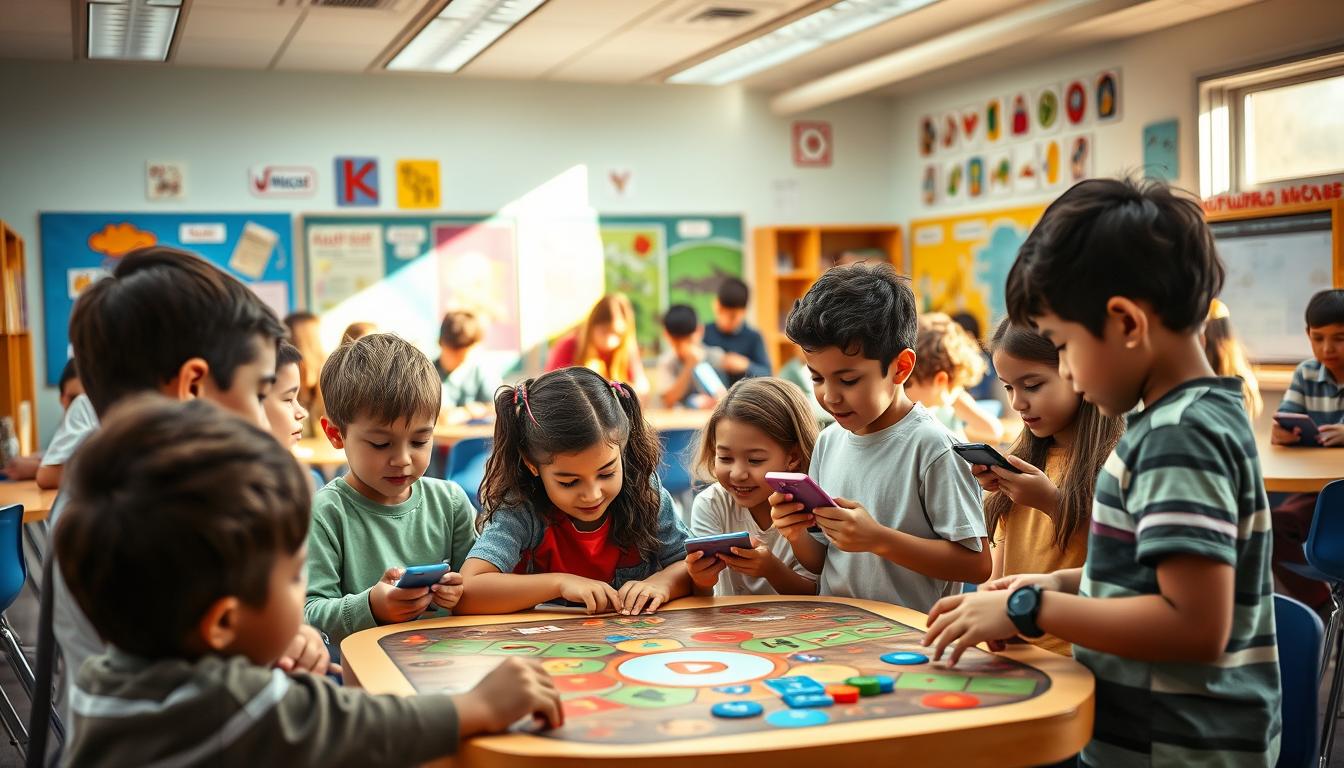Educational games to improve sound and verbal instruction retention
Have you ever wondered why traditional teaching methods often fall short in helping students retain important verbal instructions? Engaging with educational games can significantly enhance auditory memory and foster better sound retention. Interactive play helps learners of all ages sharpen their phonemic awareness and follow verbal instructions seamlessly.
This article will explore proven strategies and innovative games. These not only make learning fun but also effectively bolster sound and verbal instruction retention. These elements are crucial for academic success.
The Importance of Sound and Verbal Instruction Retention
Sound retention and verbal instruction retention are key in education. They help students absorb and use information they hear. How well someone remembers what is said affects their learning and grades.
Studies show that good auditory memory helps students follow directions well. This is crucial in school, where understanding what teachers say is important for success. In early education, remembering sounds helps with reading and understanding.

Also, students who remember verbal instructions better do well in social situations. They can join in conversations and group talks more easily. These skills help in school and in making friends, setting the stage for a lifetime of learning.
Understanding Auditory Memory and Its Benefits
Auditory memory is key for processing and remembering sounds, like words. It’s crucial for learning languages and talking well. It helps a lot in school and everyday talks.
Studies show that good auditory memory helps grow vocabulary and reading skills. Kids with strong auditory memory understand complex words better. This makes them do well in school, especially in reading and writing.

Auditory memory also helps in social areas. People with good auditory memory talk better, get social hints, and join in group talks. This skill is important for making friends and being part of the community. It makes learning and social life better.
How Educational Games Enhance Learning
Educational games are a new way to learn. They mix fun with learning, making it more engaging. This helps students remember what they hear better.
Students pay more attention and understand more when they play. This makes learning fun and effective.
Engagement and Interaction
Games make learning interactive. They create a space where students and teachers work together. This boosts critical thinking and creativity.
Students share their thoughts and learn more. This helps them remember what they hear better. It makes learning more fun and effective.
Boosting Motivation and Curiosity
Games make learning exciting. They have challenges and rewards that keep students interested. This makes them want to learn more.
Students stay engaged and practice more. This helps them remember what they hear better. It makes learning fun and effective.
Types of Educational Games for Sound Retention
Using different educational games can really help improve sound retention. Board games and card games are great for this. They make learning fun and help players remember sounds better.
Board Games
Board games are perfect for improving sound retention. They make players remember sound sequences and form words. Games like “Scrabble” and “Boggle” help with phonemic awareness.
Playing board games also helps players practice speaking in a friendly setting. This makes learning more enjoyable and effective.
Card Games
Card games are great for improving listening and remembering sounds. Games like “Sound Bingo” and “Memory Match” test players’ ability to recognize sounds. These games are good for all ages and skill levels.
Brain Games for Adult Auditory Memory
Brain games are key for improving adult auditory memory. They offer cognitive exercises that challenge and engage the mind. These games focus on phonemes, the smallest sound units in words.
They help deepen sound awareness and improve memory of what we hear.
Phoneme Isolation and Manipulation Games
Phoneme isolation games help adults identify sounds in words. This boosts their auditory awareness and phonemic skills. Manipulation games let players change sounds to make new words.
These games improve memory and make communication better.
Segmenting and Blending Activities
Segmenting games break down words into sounds. Blending games merge these sounds into words. Both improve adult auditory memory.
These exercises help process and remember verbal instructions. This boosts literacy and communication skills.
| Activity Type | Description | Benefits |
|---|---|---|
| Phoneme Isolation | Identifying single sounds in various words. | Enhances auditory awareness and phonemic skills. |
| Sound Manipulation | Altering sounds to form new words. | Improves cognitive flexibility and auditory retention. |
| Segmenting | Breaking down words into individual sounds. | Fosters processing and retention of verbal instructions. |
| Blending | Merging phonemes to create complete words. | Boosts overall literacy skills and communication. |
Incorporating Music and Rhythm Activities
Adding music and rhythm to learning can really help with phonemic awareness and remembering sounds. Melodies and rhythms make it easier for students to grasp language concepts. This way, they get to learn through hearing and doing, which is great for all kinds of learners.
It makes learning fun and engaging. Students get to practice sounds in a way that’s enjoyable.
Using Songs for Phonemic Awareness
Songs are a great tool for teaching phonemic awareness. They use lyrics that focus on certain sounds. This helps students connect what they hear with the sounds of words.
Teachers can pick songs that highlight specific sounds. This lets students hear and practice these sounds over and over. It boosts their listening skills and helps them recognize sounds in words better.
Creating Rhythmic Patterns
Getting students to make rhythmic patterns helps their memory. They can do this by clapping, tapping, or drumming. This activity strengthens the link between rhythm and recognizing sounds.
It makes remembering verbal instructions easier. Students who take part in rhythm activities do better at understanding and remembering sounds. This makes learning smoother for them.
Practical Classroom Games for Verbal Instruction
Classroom games make learning fun and engaging. They mix physical activity with verbal instruction, making it enjoyable. This approach helps students follow directions better and work together.
Sound Scavenger Hunts
Sound scavenger hunts are all about listening. Students search for sounds or objects in a set area. It’s a fun way to improve listening and teamwork skills.
Storytelling with Sound Effects
Adding sound effects to stories makes them come alive. Students can make sounds that match the story. This method helps them remember the story better and enjoy learning more.
| Game Type | Learning Outcome | Engagement Strategy |
|---|---|---|
| Sound Scavenger Hunts | Enhances auditory memory | Active listening and collaboration |
| Storytelling with Sound Effects | Improves verbal recall | Interactive participation and creativity |
Games to Develop Phonemic Awareness
Phonemic awareness games are key in building literacy skills. They help students recognize and play with sounds. These games are interactive, helping learners improve their memory of sounds.
Treasure Box Activities
Treasure box activities let students find items that match sounds. This hands-on method boosts sound recognition and encourages thinking. For instance, finding a ball for the /b/ sound or a cat for the /k/ sound makes learning fun and exciting.
Sound Toss Games
Sound toss games focus on listening and teamwork. Students toss an object while listening for sounds. This game makes learning fun and helps build the skills needed for reading and writing.
Exploring Listening Games for Adults
Listening games are a great way to boost your memory and keep adults engaged. They make learning fun by mixing social interaction with skill-building. This makes it easy to improve your listening abilities through enjoyable activities.
Follow the Leader
This game makes you pay close attention to the leader’s actions and words. You have to copy what the leader does or says. It helps you get better at noticing details and listening well.
By following directions, you also improve your communication skills. This is key for effective conversations.
Whisper Challenge
The Whisper Challenge is a fun game that shows how important clear communication is. Players whisper messages to each other, focusing on listening carefully. This game helps you understand the importance of sound and meaning.
It’s a great way to build friendships while learning about the value of listening. It makes everyday conversations more meaningful.
Using Technology for Sound Retention
Technology has changed how we learn sounds. Many learning apps make learning fun and interactive. They help students improve their sound recognition and retention skills.
These apps are designed for different learning styles. This makes learning more personal and enjoyable for everyone.
Apps and Online Games
Learning apps are great for improving sound retention. They offer fun activities that boost auditory skills. Students can practice on their own and get instant feedback.
This feedback helps them learn better. It shows how well they understand sounds.
Interactive Learning Tools
Tools like digital whiteboards and soundboards make learning fun. They encourage students to work together. This makes learning more engaging and effective.
These tools use music and phonetics. They help students appreciate the importance of sound in communication.
Strategies for Teachers and Parents
Teachers and parents are key in creating a good learning space. Using the right teaching methods can help students remember better. This makes learning more effective for everyone.
When kids have a supportive place to learn, they do better with sounds. This is important for their growth.
Creating a Supportive Learning Environment
A supportive learning space is stable and encouraging. It helps kids develop their memory for sounds. Think about both the physical and emotional sides of learning.
Having regular routines and positive feedback helps a lot. It makes students more eager to learn through sounds.
Using Frequent, Distributed Practice
Doing activities often and in different times helps remember better. Short, repeated tasks are great for improving listening skills. Adding these activities to daily life helps kids get better at remembering sounds and words.
Fun Phonemic Awareness Activities
Creative phonemic awareness activities make learning fun for students. They help improve literacy skills. Games like Sound Quest and Blending Baseball are great for this. They make learning sounds fun and interactive.
Sound Quest Games
Sound Quest games are an exciting way for students to learn sounds. They get to explore sounds in a fun way. This makes learning sounds a fun adventure.
Blending Baseball Activities
Blending Baseball mixes sports with sound blending. Students blend sounds to score runs. It’s a fun way to improve listening and speaking skills.
Incorporating Listening Skills into Daily Routine
Adding listening skills to daily life makes us more engaged and better at remembering sounds. By practicing these skills, we can use what we learn in school in real life. Two great ways to improve listening skills are through sound scavenger hunts and sound bingo.
Everyday Sound Scavenger Hunts
Sound scavenger hunts help people find and recognize sounds around them. You can do this at home or in school. It’s a fun way to improve listening skills and discover new sounds.
Sound Bingo Success
Sound bingo makes learning fun by asking players to find sounds. It helps us better hear and remember different sounds. Adding sound bingo to our daily routine makes learning fun and improves our listening skills.
How to Measure Improvement in Sound Retention
Measuring how well students remember sounds is key for teachers and parents. It helps them see if students can recall and use what they hear. This way, they can plan better for future learning.
Assessment Techniques
There are many ways to check how students do. Tests on remembering sounds are a direct way to see if they’re getting it. Tests on hearing sounds in words help too.
Students can show they understand by doing tasks. Like following directions or doing activities that use sounds.
Tracking Progress Over Time
It’s important to keep track of how students are doing over time. A log of their answers and successes shows what they’re getting right and what they need to work on. This helps teachers adjust their teaching to meet students’ needs better.
By tracking progress, teachers can make learning better. This helps students get better at remembering sounds and words.
Final Tips for Effective Engagement
Engaging learners well helps them remember better and do well in school. Using the right methods can really help students learn and remember more. Here are a couple of key strategies to think about for your teaching plans.
Using Multisensory Approaches
Using activities that involve seeing, hearing, and doing can help students remember better. This way, different parts of the brain work together, making learning stick. It’s a great way to keep students interested and learning well.
Creating Short and Active Sessions
Learning should be short and fun to keep students focused. Short, active lessons help students practice without getting tired. This shows how important it is to keep learning sessions balanced and engaging.
Conclusion
Using educational games to boost sound retention is a smart move. It helps improve how we process sounds and understand words better. These fun activities make learning about sounds more engaging, both in school and at home.
By playing different games, kids get better at remembering sounds. This helps their brains grow and prepares them for talking and learning well. It’s a great way to help them succeed in school and beyond.
It’s important to keep using games in our teaching methods. Making games a part of daily learning helps kids develop important skills. This way, they can understand and interact better in school and with friends.
FAQ
What role do educational games play in improving sound and verbal instruction retention?
Educational games make learning fun and interactive. They help improve how well we remember sounds and follow instructions. This boosts our academic performance and communication skills.
How can auditory memory affect academic success?
Good auditory memory helps us listen and follow directions better. It’s key for learning and doing well in school. It’s especially important for young kids learning to read.
What types of educational games are effective for sound retention?
Games like board games, card games, and interactive tech games are great. They help with remembering sounds and recognizing phonemes. Games like “Sound Bingo” and “Memory Match” are fun ways to practice.
How do brain games benefit adult auditory memory?
Brain games for adults focus on sounds and how to change them. They make our brains work harder. This improves our verbal skills and memory over time.
Can music and rhythm activities aid in sound retention?
Yes, music and rhythm help a lot. They make learning fun and work both sides of the brain. Songs and rhythms help us remember sounds better.
What practical classroom games can help reinforce verbal instruction?
Games like sound scavenger hunts and storytelling with sound effects are great. They help students listen and follow directions better. This improves their memory for sounds.
What strategies can teachers and parents use to create a supportive learning environment?
A supportive learning space is key. It should be stable and encouraging. Regular practice and using all senses in learning help too.
How can we measure improvement in sound retention?
We can use tests for auditory memory and phonemic awareness. Tracking progress helps us see how well students are doing. This helps us adjust our teaching methods.














